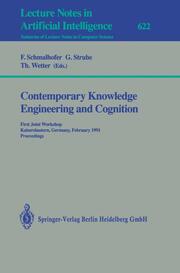-
Zusatztext
-
This book has its source in the question of whether any knowledge engineering tools can be applied or analyzed in cognition research and what insights and methods of cognitive science might be relevant for knowledge engineers. It presents the proceedings of a workshop organized by the Special Interest Groups Cognition and Knowledge Engineering of the German Society for Informatics, held in February 1992 in Kaiserslautern. The book is structured into three parts. The first part contrasts work in knowledge engineering with approaches from the side of the "soft sciences". The second part deals with case-based approaches in expert systems. Cognition research and the cognitive adequacy of expert systems are discussed in the third part. Contributions from Canada, England, France, Switzerland, and the USA demonstrate how knowledge engineering and cognitive science are woven together internationally.
-
-
Autorenportrait
- InhaltsangabeRelations between knowledge engineering and cognitive science: From import/export to a truly interdisciplinary knowledge acquisition enterprise.- Making application programming more worthwhile.- Using information technology to solve real world problems.- Facts, fantasies and frameworks: the design of a knowledge acquisition workbench.- Mapping expert behavior onto task-level frameworks: The need for "Eco-pragmatic" approaches to knowledge engineering.- Knowledge acquisition and the interpretative paradigm.- Case-based reasoning and model-based knowledge-acquisition.- The refitting of plans by a human expert.- Knowledge acquisition by generating skeletal plans from real world cases.- Knowledge acquisition from cases.- Transforming examples into cases.- Case-based reasoning and expert system development.- The role of cognitive science in knowledge engineering.- Knowledge acquisition as an empirically based modelling activity.- Shifting positions: Moving from a cognitive science point of view to a knowledge engineering stance.- Two questions from expert system developers to cognitive scientists.- The cognitive basis of knowledge engineering.- A comparative assessment of selected approaches in the focal area of knowledge engineering and cognition.
Detailansicht
Contemporary Knowledge Engineering and Cognition
First Joint Workshop, Kaiserslautern, Germany, February 21-22,1991.Proceedings, Lecture Notes in Computer Science 622 - Lecture Notes in Artificial Intelligence
ISBN/EAN: 9783540557111
Umbreit-Nr.: 1434367
Sprache:
Englisch
Umfang: xii, 260 S.
Format in cm:
Einband:
kartoniertes Buch
Erschienen am 12.08.1992


